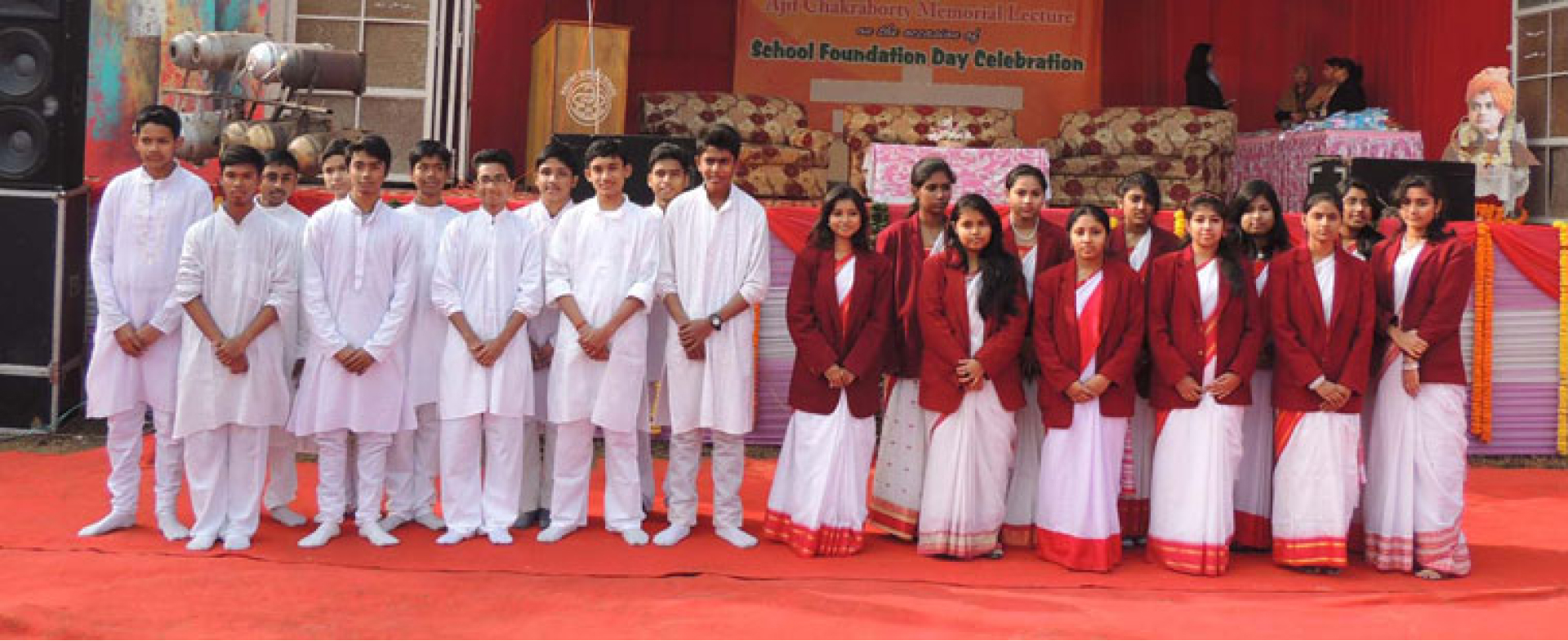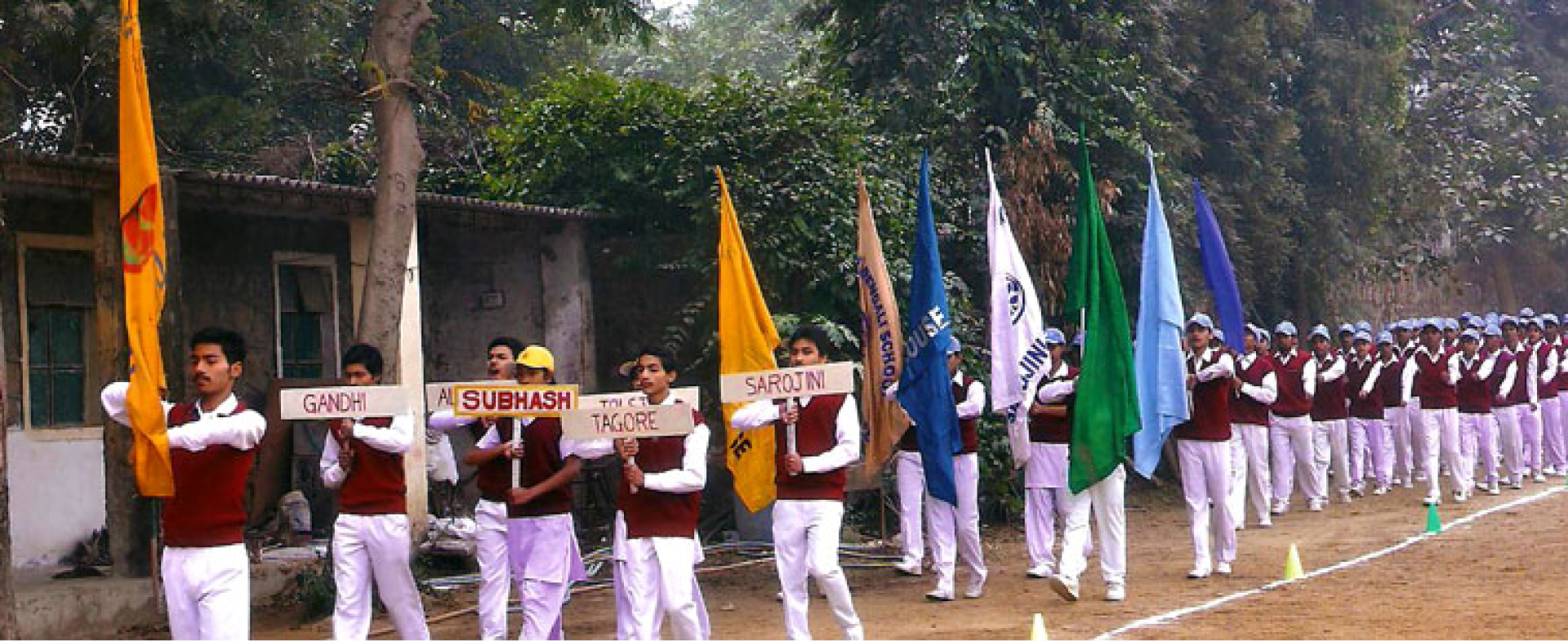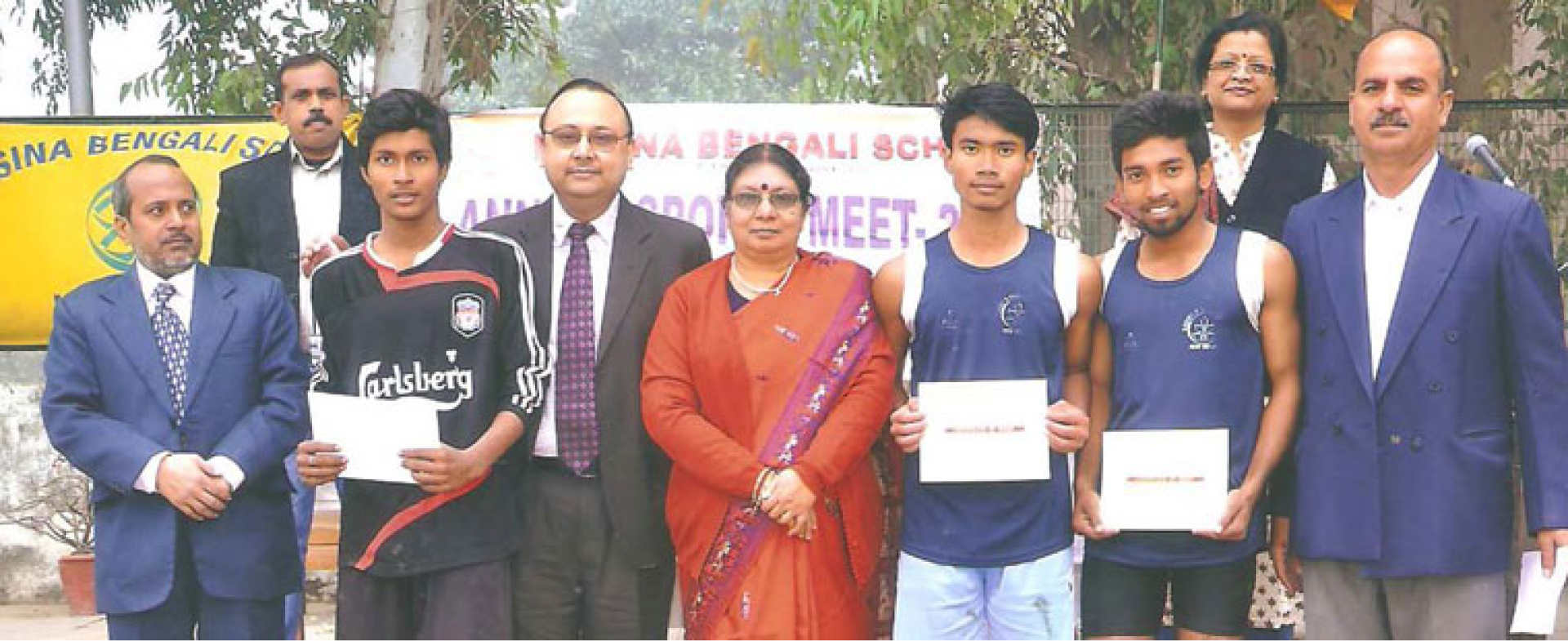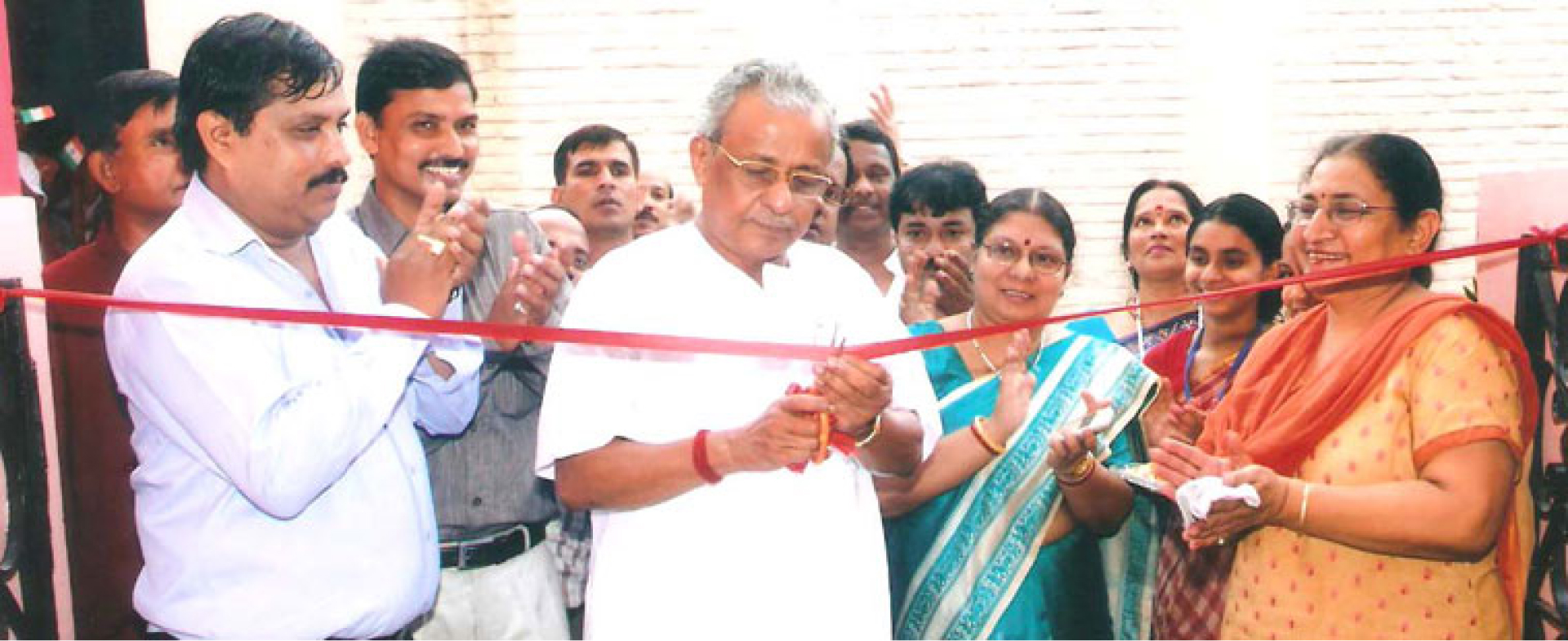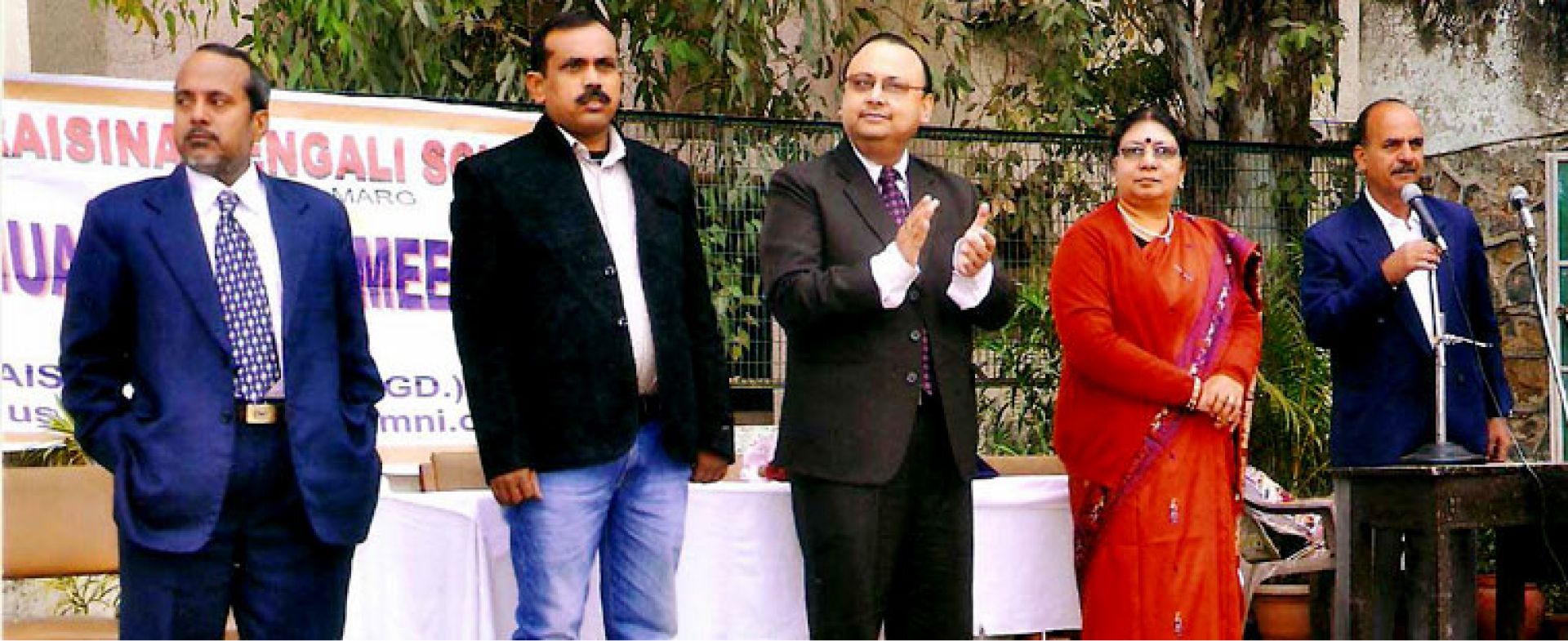
ABOUT US
The Raisina Bengali School, established in 1925, is one of the premier educational institutions in the heart of the National Capital of Delhi. It has, since then, left its indelible imprint in educational, social and cultural fields through its illustrious students who have made themselves indispensable in the fields of Medicine, Science, Art, Administration and sports not only in India but also in other parts of the world. Today’s Raisina is a Vatican in the field of education in India. Our school has already celebrated many grand festivals like Silver Jubilee, Golden Jubilee, Diamond Jubilee and the 70th year with luminaries like Chaudhury Brahma Prakash First Chief Minister of Delhi, ex-Presidents Late Fakhruddin Ali Ahmed, Late Giani Zail Singh, ex-Prime Minister Late Rajiv Gandhi, Chief Minister Shri Jyoti Basu, Retd. Chief Justice Shri P.N. Bhagwati, ex-Lt. Governors of Delhi Shri D.R.Kohli, Shri Jagmohan, Shri H.L.Kapoor and Retd. General Shri Shankar Roychoudhury as distinguished visitors.
The school has celebrated Golden Jubilee and Diamond Jubilee in the year 1975 and 1985 respectively. We had had the honour to have with us the then President of India Late Fakhruddin Ali Ahmed and Late Giani Zail Singh on both the occasion. The school has celebrated Platinum Jubilee on 11th October 2001. Shri Vijai Kapoor, the then Lt. Governor of Delhi was the Chief Guest on the solemn occasion. Recently, we have celebrated Annual day cum Prize distribution ceremony after a gap of couple of years and it was befitting in every aspect as the two days function have been inaugurated and graced by Smt. Sheila Dixit, Chief Minister, Govt. of N.C.T. of Delhi and Shri Pranab Mukherjee, Minister of External Affairs, Government of India and Shri Parimal Rai, President, New Delhi Municipal Committee
ACHIEVEMENTS
RESULT:
The result of the school and the overall performance in the Board’s examination has been all along outstanding. In fact, Raisina Bengali School, Mandir Marg has been enjoying the status of topper in the Zone un- challenged for the last two decades. Our last year Board’s result was 100%. The average result of the school in the Board’s examination is more than 98%. Co-Curricular Activities
This school has been participating and organizing regularly zonal tournaments as well as other tournaments organized by the Delhi Sports Association and Indian Olympic Association. The students have not only excelled themselves in these field but they have bagged many prizes and awards from various tournaments including representing India in Football and Athletics. Apart from sports, the students regularly participate in the painting competitions, debate, recitation etc. In fact our Art department is simply outstanding. Our students not only brought fame to the school in this stream but they are simply the best. The students have not only won President’s Award, Soviet Land Nehru Award, Shankar’s painting competition award represented India in the International events but they have bagged running trophy from the Rail Museum, Traffic Police, Trade Fair Authority and won many other coveted awards in the field of Painting and Fine Arts.
Scout and Guide
Our Scout and Guide students participated in the 3rd SAARC and 13th National Jamboree meet in Orissa. Our students also shared the state awards in Scout and Guide. Students of our school were also awarded with the `Rashtrapati Award’ in Scout and Guide. Most successful among all is the participation of one of our student representing India as Troop Leader in 5th Nippon venture 2000 in Japan. He gave an excellent performance there and stood first in his base camp event.
Yoga
Yoga is another achievement of our school. Our yoga teacher has been awarded with the `Yoga Shiromani’ and `Yoga Acharya’ awards. Yoga performances by the students were widely acclaimed on number of occasions.
N.C.C.
Raisina Bengali School has a full-fledged N.C.C. Unit. Besides organizing events such as debates, camps etc. the NCC boys have participated in various NCC exhibition of the State.
Eco Club
Eco club and environmental studies – We have an actively functioning eco club for our students being run with the help of the Govt. of N.C.T. of Delhi. The club organizes various useful activities in addition to its normal functioning of planting trees and they are:
i) Poster and Painting competition on wild life and nature.
ii) Inter house competition on street play.
Our students are regularly participating in the quiz competition organized by sports body and reputed channels like ESPN etc. They participate regularly in Shram Dan activities and number of times participated in Marathon race organized by various bodies like Indian Olympic Association and Indian Oil for oil conservation etc.
A brief resume of the school of its foundation and glory is attached with the enclosure.
Development project and other activities
1. Building and Construction
i) Science Block:
Science Block was constructed in the late sixties. The building could house two Science Labs viz. Chemistry and Physics. Though the requirement was high, it started with a modest beginning. The lab facility, which could be attributed to a very moderate one, needs complete remodeling and renovation to bring it at par with the modern system and gazette on the basis of the present curriculum.
An urgent need was felt for the construction of a Biology lab and make the Science Block look like a composite Science Block where Science students can have easy access of lab facility under one roof and can function cohesively. Construction of the first floor took place in the early seventies and Biology laboratory was shifted there from the main Block. More professional courses have been introduced with the passage of time. The Central Board of Secondary Education. had introduced Computer Science as a subject in the school. The school has been managing somehow Computer Lab in one classroom in the Science Block as a temporary arrangement. It needs proper laboratory and a complete expansion with the latest gadget and equipments where it can function independently as well as on LAN line. However, another project under the aegis of Delhi Administration with the help of Aptech known as CEP has been added and this has come at a right moment where we could give computer lab facility to Middle and Secondary department.
The Science Block building needs a complete structural repair and a facelift including follow certain guidelines as a precautionary measure. This area being on the upper ridge, a complete under ground draining system is essential to keep the building safe and its foundation intact. The project comprises civil construction and equipments related to technical in nature, the tentative cost of the project would be around Rs.25, 00,000 lacs only.
ii) Sports complex and Auditorium
Another prime project initiated under the behest of the then Governing Body of the school and two great luminaries viz. Late Rajiv Gandhi, President Youth Congress and Shri Jyoti Basu, ex- Chief Minister, Government of West Bengal laid the foundation and participated in the inauguration ceremony. The building comprises of a Sports cum Gymnasium hall in the basement, a stage to perform and a seminar room. It requires not only a face-lift but also completion of the total project. The Seminar Room requires modern sitting arrangements, installation of modern audio-visual system etc. The stage is not even a half finished structure. For all purposes, it requires a modern stage having the facility of proper lighting and other arrangements like amphitheatre zones etc. Proper arrangement portion by portion of the basement for better utilization and playing arena for indoor games is essential. A proper Green Room is required for the functions. The project comprises civil construction and equipment of varied nature; the total cost of the project would be around Rs.15, 00,000 lacs only.
3. Play Ground
From every aspect and all practical purpose playground is essential for the growth of the children. The playground, which was sanctioned by the Government of India in the Upper Ridge, is a prestigious thing of the school. Though some development work and leveling could be done at the initial stage, much more remains to be done to give it an appropriate shape to bring it to the expected standard where track and field, proper Volley Ball, Basket Ball courts Foot Ball and Cricket play ground can function at a time without disturbing one another. Water is an integral part of the whole system. Ridge area is at a higher level than the ground level position. Regular water supply is possible if we make our own arrangement. For this, we are to explore Ground Water facility and may have to dig deep down to a considerable depth to get the un-interrupted water supply. The project is of a varied nature and determining exactness is very difficult at the beginning of the project, an amount to the tune of Rs.25, 00,000/-Lacs. To 30,00,000/- would be needed to complete the project.
4. Primary Block
The Two Storied Primary Block of the school completed in a phase-by-phase manner. Though it is managing all the classes at present the feeder section i.e. Nursery needs a separate block or can be a part of the extended Primary Block where a proper class rooms for the tiny tots and a separate lavatory block together with a medical room can find a place. Some modern equipments and gadgets are also needed to give it a proper shape. The project may cost approx. Rs.20, 00,000/-
5. Libraries and Information Science
The present Library of this school is a treasure and for this the Raisina Bengali School can boost itself for its impressive collection of books and it is really a matter of pride for the institution. It is quite big in relation to school library and is having more than 25,000 books approx. on different topics and subject. Though the library, which has also reading room facilities, is housed in a spacious and well furnished hall with open shelf system now a days finding it difficult to properly shelve the books for just want of space. Because of that the almirahs are kept face-to-face in the long corridor. Apart from reference books, periodicals etc., it has added Audio Visual programmer tool as a teaching method in the junior and senior sections. For easy reference and referral computer facility has been added and students can see and download as per their requirement.
6. Staff Room
Raisina Bengali School, Mandir Marg has 04 staff rooms for the Teaching Staff only. Keeping the convenience of the Faculty Members in mind each staff member is provided with separate locker and fix seating arrangement.
History of Raisina Bengali School
Wikipedia
Raisina Bengali School completed 86th year of its existence on 1st January, 2010. Eighty six years in the life of an educational institution indeed is a long period. But looking back at the rich experience that the school had before it started, and all through its chequered history, the students, parents and teachers, who are associated with the school, feel just proud of the institution. When the school started on 2nd January,1925, it had only 57 students on its roll and one solitary teacher Shri Makhan Lal Mukherjee. It was started as a Middle school and temporarily run from the then Willingdon Hospital presently known as Ram Manohar Lohia Hospital.
Eighty six years ago on 2nd January, an educational institution was formed on the lap of the new capital city of India, emerging over the debris of a deserted village called Raisina, as though to perpetuate the memory of that first disappearing rural character and waking to light and sound and consciousness linked with the rich tradition and culture of a people 1400 kilometers away. It emerged and was at once hailed with reverence by the Bengali Community. As years rolled on, it grew in stature and achievement with experiences of many alternating, unfolding caressingly the annals of a chequered career of glorious past and to-day commemorating 86th year with pride and thankfulness and acknowledge good wishes from all.
It is a long history how it came into being. It originated in the natural appeal of the circumstances created by the transfer from Calcutta of the offices of the Deputy Accountant General, Central Revenues; Accountant General, Central Revenues; Deputy Controller of Currency, Northern India; and the Comptroller and Auditor General of India, which brought with them a good number Bengali employees, all of whom wanted opportunities of proper education for their wards. The first ground work in this direction was laid by a few enterprising Bengali gentlemen whose names will always be remembered with reverence and gratitude by the community. Shri Gokul Chandra Mukherjee was the leading pioneer who, in 1922, moved Mr. J.A.Richie, the then Education Commissioner, Government of India, through Rai Bahadur Manmatha Nath Chakrabarty, Registrar, Department of Education, Health and Lands of Government of India, for opening a school, where education could be imparted through the medium of Bengali. Shri Mukher got the willing support and assistance of Sarbasree Madhusudan Chakrabarty, Amrita Lal Benerjee, Khetra Mohan Singh, Phani Bhushan Chakrabarty and Sailendra Nath Sen. Mr Richie was reluctant to the appeal of opening of a separate Bengali School, but the determination and persuasion of Shri Mukherjee to the noble cause gave him inspiration to send a representation to Sir Frederick Gauntlet, the then Auditor General, requesting him to make arrangements for the education of the children of Bengali Government employees. Sir Frederick took a sympathetic view and through his intervention, the Government agreed to the proposal for a separate Bengali School.
At a meting of the Bengali residents of Raisina Hill surroundings, held on 28th December, 1925, at 24, Dalhousie Square, it was decided to start the school. A Managing Committee for the proposed school was formed consisting of the following office-bearers and members:
President
Vice President
Secretary
Members
Shri Khetra Mohan Singh
Capt. A.B.Roy Choudhury
Shri Surendra Nath Bhattacharjee
Shri Gokul Chandra Mukherjee
Shri Radha Ranjan Bose
Shri Madhu Sudan Chakrabarty
The first Head Master to be appointed was Shri Prabhat Chandra Sen, who, however, stayed for a short period. He was succeeded by Shri Satish Chandra Ganguly, who joined the school in 1926. The teachers who joined Shri Ganguly at that time were Sarbashri Nani Lal Sen, Hara Prasanna Banerjee, Naresh Chandra Ganguly, Bhutesh Bhattacharjee and Manmatha Nath Mazumdar.
In the later part of 1927, Shri Ramesh Chandra Sengupta was appointed Head-Master of the school. In the calibre year the school shifted to a rented building in Doctor’s lane, as the premises occupied by it was required to house the Willingdon Hospital. Shri Sengupta was a dynamic personality who combined in himself the rare virtues of a teacher of the highest caliber, an able, an able administrator and a person gifted with imagination and far-sightedness. During his tenure as the Headmaster (1927-1944), the school achieved a unique position with virtual monopoly, as it were, of glorious results in the High School Examination and all round development of the pupil that came within its fold. The constitution of the school was framed and adopted on 24th February, 1929. The school was, however, given recognition as a High School, a year earlier on the 26th November, 1928. In the first year of its recognition, it showed the prodigy of its creative genius by producing Shri Pashuipati Mukherjee, who stood first in the High School Examination.
The school henceforth began to flourish, and the number of scholars continued to mount raising the problem of accommodation, which was temporarily solved by the occupation of the bungalow at Lady Hardinge Road, now used by the D.A.V. Management. 22nd September, 1932, stands as a land mark in the history of the school, when the Govt. allotted the present premises to the school, free of rent, the maintenance of the building being vested in the New Delhi Municipal Committee.
The school was registered under the Society Registration Act (XVlll of 1860), on the 21st September, 1939. The scheme of Higher Secondary Education was introduced in Delhi in 1943 and because of the very high standard maintained by our school, it was one of the few institutions to be given recognition as a Higher Secondary School in the very year of its introduction. This was followed by permanent recognition in 1945. R.C.Sengupta left the institution in 1944 and with his departure there was a general fall in the standard of the school. A new and dynamic Managing Committee was formed in 1946, headed by Shri Nishikanta Sen, a distinguished educationist, Dr. S.N.Sen, Vice Chancellor of Delhi University as Vice-President and Dr. A.B.Roy Choudhury as Secretary and Manager. The Committee of Management appointed Shri Ajit Kumar Chakravartty, as the new Principal of the school in September, 1947 under whom the school turned the corner. He had to work hard to overcome many difficulties. But he managed the school affairs with skill and imagination and he earned respect and co-operation from one and all. The result of Higher Secondary Examination and general condition of the school again started looking up. The improvement attracted many good students and the results of the school surpassed even those in the regime of Late Ramesh Chandra Sengupta. The students also excelled in all competitive examinations and they took keen interest in Games and sports and in all other co-curricular activities. The reputation of the school spread far during the regime of Shri Ajit Kumar Chakravartty. As a mark of respect and appreciation of the services rendered by Shri Ajit Kumar Chakravartty in the field of education, the Government selected him for a State Award. As he himself was a student of Raisina School, the Raisina fraternity feels all the more proud of this recognition. Shri Ajit Kumar Chakravartty retired from the school in the year 1970. The school suffered yet another set back after he left the school. Under the able stewardship of the then Governing Body headed by Shri B.Chatterjee, I.P., President the school started functioning well. The appointment of Dr. A.N.Banerjee in the year 1977 was another land mark for Raisina. It was under his quality administration and good leadership the school started flourishing again and the roll strength of the school began to mount progressively necessitating the appointment of new teachers, faculties, new buildings as well as new blocks. The tenure of Dr. Banerjee can be attributed as modern era of Raisina that we see today. Because of his quality, talent and administrative control over all including brilliance in academic achievement the Government selected him for ’State Award’. Dr. Banerjee left the school in the year 1995.
The School achieved another milestone in the year 1988 when due to the strong-willed effort and determination of the Governing Body it spread its wing and moved out of the periphery of Raisina Hill to open another school at Chittaranjan Park, New Delhi, a densely populated residential area of Bengali community of this metropolis. The school came up in two different plots, one is housing Primary department and another is Senior Secondary Department.
The school celebrated Silver Jubilee in the year 1950. Chaudhury Bramha Prakash, First Chief Minister of Delhi visited the school in the year 1952.Golden Jubilee of the School was celebrated in the year 1975. Diamond Jubilee was celebrated in the year 1985 and Platinum Jubilee was celebrated in the year 2001. Golden Jubilee and Diamond Jubilee of the school was inaugurated successively none other than the President of India Late Fakhruddin Ali Ahmed and Late Giani Zail Singh. Platinum Jubilee was inaugurated by Shri Vijai Kapoor, Lt. Governor of Delhi.
Looking back into the past we also have to commend the spirit and foresight of the pioneers and the successive Managing Committees for their steadfast faith in democracy. The school was not set up with the help of any endowment. The Governing Body is elected on the principle of every guardian and every donor having a single vote. This system has helped the school in growing and developing its activities during the last fifty years from the inherent strength of democratic institutions. It is no wonder that this institution is held very close to the heart by the capital’s Bengali community.
